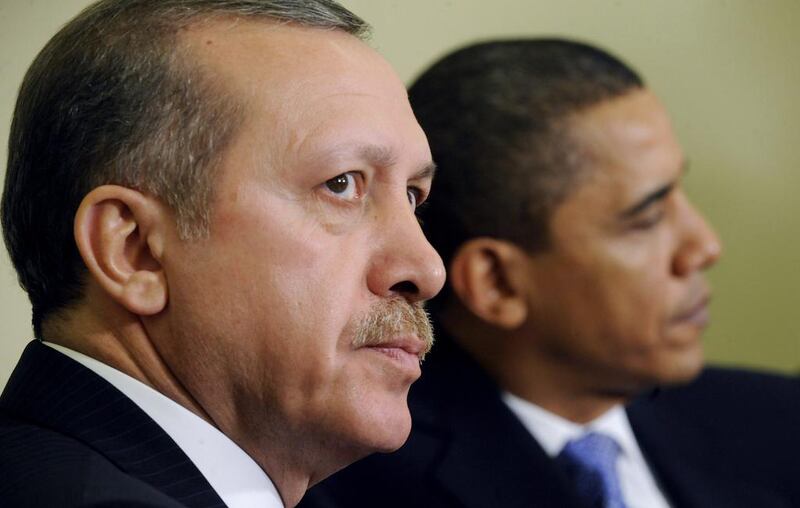ISTANBUL // Turkish president Recep Tayyip Erdogan flew to the United States on Tuesday for only the second visit of his presidency at a time when relations between the two Nato allies are severely tested by widening differences over the Syrian conflict and human rights.
Mr Erdogan, who became president in August 2014 after over a decade as prime minister, has yet to hold talks with president Barack Obama at the White House as head of state, and no such encounter is planned for this trip in a glaring symbol of the current troubles in relations.
Turkish officials insist the main point of Mr Erdogan’s trip is to attend the two-day Nuclear Security Summit in Washington, beginning on March 31, and also open a Ottoman-style mosque in Maryland, a new statement of Turkey’s desire to spread its cultural and religious influence abroad.
The White House said on Monday that there were no plans for bilateral talks between Mr Obama and Mr Erdogan, who last visited the US for the UN General Assembly in September 2014.
Leaving for Washington from Istanbul airport, Mr Erdogan said he would meet the US president on the sidelines of the nuclear summit but indicated that it was still undecided what form the encounter should take.
A Turkish presidential statement did not mention Mr Obama, but said Mr Erdogan would hold talks on the anti-terror fight following the Brussels attacks and those that rocked Istanbul and Ankara earlier this month.
According to Turkey's Hurriyet newspaper, Mr Erdogan had wanted to open the new mosque in Maryland — touted by Turkey as the only one in the United States with two minarets — alongside Mr Obama but the US president turned down the idea.
Turkey — which joined Nato in 1952 as a US ally after staying neutral for almost all of World War II — has long been seen as Washington’s key Muslim partner in the Middle East.
But tensions have grown over the conflict in Syria, with the US urging Turkey to do more to fight ISIL and Ankara growing ever more frustrated over American backing for Kurdish fighters.
While defeating ISIL is the US’ top priority in Syria, Turkey’s main aim is the overthrow of president Bashar Al Assad, a prospect that has become less likely with Russian intervention in his support.
In addition, Washington has been backing Kurdish Syrian fighters of the Democratic Union Party (PYD) as the best force in the fight against ISIL.
Turkey, meanwhile, categorises the PYD as the Syrian branch of the Kurdistan Workers Party (PKK), which has fought a decades-long insurgency against the Turkish state.
“The relationship between the US and Turkey is strained generally because of the differing priorities of the two allies in Syria and more specifically due to their perceptions of the PYD,” said Ozgur Unluhisarcikli, Ankara office director of the non-profit German Marshall Fund of the United States, which aims to strengthen transatlantic cooperation.
He said Turkey and the US were “stepping on each other’s toes” in Syria.
“Until either or both of the sides revise their approach to PYD, the US-Turkey relationship will continue to be poisoned by this issue,” he added.
Adding to the strains are US concerns over freedom of expression in Turkey under Mr Erdogan, with tweets by the US embassy supporting prosecuted academics and journalists making ambassador John Bass a hate figure for hardliners.
“We don’t always agree on everything — media freedom is one of them,” said US state department spokesman John Kirby.
Meanwhile, the surprise arrest in the US last week of Turkish-Iranian businessman Reza Zarrab who was implicated in a 2013 corruption scandal that also ensnared Mr Erdogan’s close circle, has been hailed by the president’s foes.
During his trip to the US, Mr Erdogan will also meet leaders of the American Jewish community, as Turkey seeks to repair its damaged ties with Israel.
* Agence France-Presse





